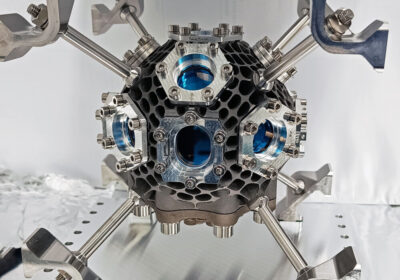If you’ve been gripped by the brutish award-winning series Succession, you’ll be forgiven for picturing every top-level management transition as a dynastic psychodrama. Yet, as technical toolmaker and trade moulder Cybertools can testify, the retention struggle for UK SMEs in the manufacturing space can be eased with some sensible forward planning combined with the support of external industry training.
Succession planning is something that every business needs to face. Whether through retirement or an unexpected shift in personnel, having a plan is strategically crucial. However, it is not an overnight process.
Marking an important phase in the company’s growth and having just secured a 40-percent share in a Chinese-based tooling factory, founder and leader of Cybertools Paul Brown has put in place a robust plan for the Buntingford-based firm’s business continuity. Investing heavily in his workforce, the forward-looking MD is one of the strongest advocates of removing development barriers and nurturing talent internally.
Rather than reacting and filling positions passively, Cybertools is instead developing its workforce to grow into these future gaps. Part of this process includes incrementally adding responsibilities and booking team members onto the IOM3-accredited Sumitomo (SHI) Demag Academy courses run by Darren Vater-Hutchison.
Mould Setter Leo, accompanied by Quality Control Production Trainee Jiji, are now on an accelerated progression journey at Cybertools, with a vested interest in carrying forward the company’s legacy.
A rising tide lifts all boats
As the third largest employer in the UK, the plastics industry comprises a high proportion of SMEs. Like Cybertools, most of these are lean, family-run businesses, headed up by owners looking to retire in the next decade or sooner.
With the industry’s technical education and skills system still teetering on a precipice, and conscious that time is ticking, Paul took the proactive steps to invest in his teams’ future, earmarking several colleagues for progression and booking them onto three Academy courses. Leo is three quarters of the way through his development program at the Daventry facility, with just the Advanced Injection Moulding course to complete. Jiji is close behind.

Jigi (L) and Leo (R) with Cybertools founder and leader Paul Brown, a strong advocate of removing development barriers and nurturing talent internally.
The reciprocal, and equitable benefits of investing in development, are multiple, exclaims Paul. “We are creating a work environment where everyone can feel they can give their best and that this will lead to a fulfilling career pathway. By extension, it increases their confidence in our business, which increases loyalty. The more skilled team members become, the more I can delegate and step back from the day-to-day management tasks.”
Returning from their respective Sumitomo (SHI) Demag Academy courses at the end of 2023, both Leo and Jiji expressed heightened confidence in operating the injection moulding machines and a more detailed understanding of advanced setter processes.
Although subtle, the productivity benefits are also evident states Paul. “Confidence results in quicker set up times. This probably gives us 2-3 hours more of production capacity each week. However, the most noteworthy benefit is the swift return on investment. Knowledge equals expertise; expertise equals value; and valued people feel more seen and appreciated.”
Tapping diverse perspectives
The result is a contagious culture. “Positive and driven colleagues motivate others. When my team return from a course sharing everything they have learned with their production peers, it only reaffirms the importance of investing in skills,” adds Paul.
Examining the wider challenges, Paul encourages leaders who are scouting for talent to look for potential rather than pedigree. “Given the scarcity of academic technical training, utilising well-respected development frameworks designed by people who understand the ins and outs of our industry can help our future leaders to define and steer their career pathway. Another sideline benefit is we are empowering future mentors.”
Industry trainer and one of the masterminds behind the winning 2023 Plastic Industry Awards training & development program, Darren Vater-Hutchison concurs. Having delivered courses to over 700 industry colleagues at Sumitomo (SHI) Demag’s IOM3-accredited Academy, Darren expands: “High quality industry training can help to address the lack of curriculum investment and provides a more direct and immediate solution to local and national skills shortages. Machines make parts. However, knowledge creates value. This value increases markedly as knowledge moves up the scale. Most importantly, this accumulative knowledge is being passed onto to future leaders.”

Earning the certificate in Toolsetting Technology (TSett) and Mould Mounting (MMount), Quality Control Production Trainee Jigi demonstrates his understanding of moulding processes to colleagues.
Earning the certificate in Toolsetting Technology (TSett) and Mould Mounting (MMount), Jiji, who joined Cybertools with no significant engineering knowledge, has reached the halfway point in his professional development program. Jiji comments: “The Academy courses have helped me to gain a better understanding of moulding processes and how they relate to QC issues. I am more confident in my ability to get good results from the machines with an understanding of cause and effect in the processes. This is giving me the confidence to progress as a tool setter which will hopefully open up even more career possibilities in the future.”
Testament to the progression opportunities, Leo commenced his career with Cybertools as a temporary picker and packer. Now running the UK mould shop, he recently started to provide input into major project quotations. Leo comments: “The Academy training has given me a more advanced machine understanding and guidance on ways to be more precise with process adjustments.” Leo is eager to continue putting this advanced knowledge into practice, and hopes to shortly complete the Advanced Injection Moulding (AIM) course to further his knowledge and career.
Attesting to the importance of training, Paul says that when the right person comes along who clicks with your business and culture, you just know that making the investment is worth it. “Developing staff is a long game. Jiji proved straight away that he was good with detail, which is perfect for QC work. Having tuned his technical abilities, Leo is now running our mould shop.”

Showcasing the progression possibilities, Leo commenced his career with Cybertools as a temporary picker and packer and now runs the UK mould shop.
Paul cautions that failure to listen and address workforce needs could result in alienating and losing your future talents and company successors. “People need to have a workspace where they can feel they can thrive and progress. Much of this can be underpinned by clear development goals and a good training program.”
The Sumitomo (SHI) Demag Academy offers a mix of structured and bespoke polymer processing and industry-led training and development courses, aimed at all operational levels, from new starters to tool setters, engineers and asset care managers. All course content has been designed to enhance skills knowledge, workforce productivity and Overall Equipment Effectiveness (OEE).






